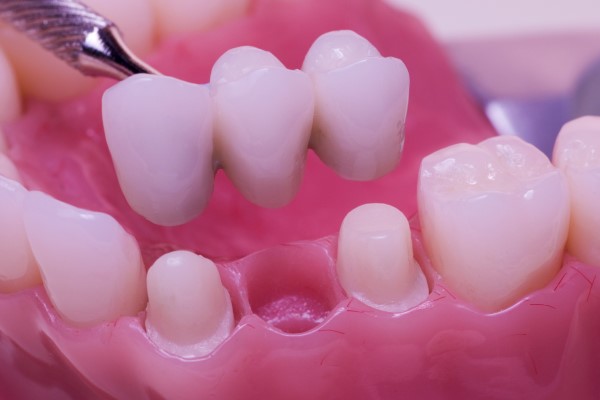Fixed Dentistry for Dental Restoration – Dental Bridges

A bridge is a custom-made fixed dentistry restoration to fill the gap left by one or more missing teeth. The bridge restores dental function and helps preserve the appearance of your face. The dentist will recommend a suitable type of dental bridge based on the specific needs of the patient. This article covers what you need to know about the process.
Prosthodontics: Who needs a dental bridge?
Losing a tooth can be devastating. Teeth are designed to function together. When a tooth is missing, the teeth near the gap can shift or tilt into the gap. The teeth in the opposite jaw may also move awkwardly into the gap when biting or chewing. This can put undue stress on the jaw joint and teeth, potentially causing discomfort and damage.
It is harder to clean shifted or crooked teeth, placing them at higher risk of tooth decay and gum disease. Once a tooth is lost on the jaw, the jawbone may start to shrink without proper stimulation. If this occurs, it may alter the facial structure and make the person look older.
Placing a fixed bridge
A dental bridge in fixed dentistry allows the dentist to use the existing natural teeth on the two sides of the gap to hold the new tooth in place. Fitting a patient with a bridge typically takes more than one dental appointment.
During the first appointment, the dentist will prepare the teeth on both sides of the missing tooth. The bridge will get support from these teeth. Impressions or digital images of the teeth and gap will be taken. The information will be sent to a dental laboratory where the technicians will use that to produce the dental bridge. The bridge can be produced from metal, ceramics or a combination of both materials. The dentist will discuss the most suitable option during the appointment.
While waiting for the completion of the final bridge, the dentist will fit the patient with a temporary bridge to protect the prepared teeth. When the permanent bridge is ready, the patient will return for a second appointment. The dentist will fit and adjust the bridge as necessary before cementing the bridge permanently. The bridge is fixed and can only be taken out by a dental professional.
Caring for the dental bridge
The dental bridge may fail if the supporting teeth or jawbone get infected by dental disease. Patients need to take oral hygiene routines seriously to maintain good oral health. Tips for caring for bridges include:
- Brush the teeth twice daily and clean between the teeth with floss; brushing and flossing help clean plaque (a sticky bacterial film) from the surface and between the teeth
- Clean under the bridge; there are dental tools to make the process easy, and patients can ask their dentist for recommendations
- Visit the dentist regularly for dental exams and professional teeth cleaning
- Consume a healthy diet, and reduce intake of sticky and sugary treats
Final note
Dental bridges are indirect restorations in fixed dentistry and are designed to be permanent replacements for missing teeth. If you have a missing tooth, talk to the general dentist to discuss your options.
Get more information here: https://ashley1dental.com or call Ashley Family Dental at (713) 405-3499
Check out what others are saying about our services on Yelp: Read our Yelp reviews.
Related Posts
Dental veneers enhance the smile with a blend of beauty, efficiency, and durability. These thin shells bond to the front of teeth to correct chips, stains, gaps, and minor misalignment with precision. But like any dental treatment, there are some trade-offs to consider. Weighing the pros and cons of veneers can help patients decide whether…
Patients often wonder what occurs during an oral cancer screening at a dental office. Dentists are trained to provide visual oral cancer screenings. Depending on someone’s lifestyle choices or family history, the dentist may suggest an oral cancer screening. These visual exams take just a few minutes to perform and can be life-saving. Early diagnosis…
Dental crowns are widely used to restore damaged or weakened teeth, providing durability, strength, and a natural appearance. A dental crown can last many years with proper care, but it may face complications over time, like any dental restoration. Understanding these common issues and how to address them can help patients maintain their crown's health…
General dentists provide essential care to support oral health at every age, including well into adulthood and throughout the golden years. The goal is to help keep the smile in good shape so that it stays healthy, comfortable, and functional. Dental professionals can also address age-related oral health concerns, keeping you on track for a…
